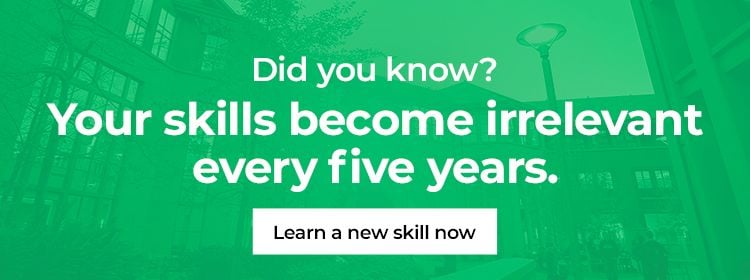7 Questions to Ask Yourself Before Signing Up for an Online Course

Thinking about enrolling in a remote class to advance your career? The benefits are irresistible. You have the convenience of learning from your sofa and the serious skills development that can push your career to the next level. To see if a remote program is a good match for you, check your answers to these questions before signing up for a new, online course.
Q: Are You Self-Motivated and Disciplined?
A1. Yes! If you’re independent, persistent when faced with obstacles, and a take-action person who finishes what you start, then add an online class to your to-do list with confidence.
A2. Not sure. Procrastinators, people-pleasers, and group-thinkers; don’t count yourself out of online learning. Remote courses can be a great fit for those who need outside accountability. Firstly, select a program that prioritizes group discussions, office hours, and interactive activities. Secondly, to keep you on track, a graded course with deadlines for group assignments might be a better choice than a pass/fail program.
Q: Will It Help Your Career?
A1. Yes! If the program content aligns exactly with the skills you need to land a promotion, jump to a better job, or pivot to a more lucrative field, no need to hesitate.
Top online programs are one step ahead of trends, offering the most relevant skills for your career. For instance, Github reported that Python had become more popular than Java and was the first choice for machine learning applications. Before this, online education provider Emeritus had already trained multiple cohorts of learners across the world in Python and ML.
A2. Not sure. Even if you’re not following a roadmap to the C-suite, there is tremendous value in expanding your horizons and developing new skills. Additionally, you can pursue knowledge adjacent to the work you do already. For instance, a healthcare administrator will gain an innovator’s mindset from a design thinking course, perhaps for a new medical device. A career-adjacent certification makes a practical addition to your résumé.
However, so does diving deep into a subject outside your expertise, simply because you find it fascinating. When a software developer, for instance, takes an online course on private equity, it shows recruiters a person of range and curiosity, with a commitment to lifelong learning. Self-improvement has no downside.
Q: Do You Have Access to Technology and Know How to Use It?
A1. Yes! If you have a laptop, computer, tablet, high-speed internet, and updated versions of a search browser, you can log in and get learning with no difficulty. Especially, if you’re comfortable navigating digital platforms and have basic skills such as downloading documents.
A2. Not sure. Unreliable internet or a cracked laptop might make it a little challenging to be an online student, but there are workarounds. Most online education platforms offer a mobile app, so you only need a smartphone to register and begin instruction.
If you aren’t tech-savvy, do not worry! Online education platforms provide step-by-step onscreen instructions. Also, make sure their tech support is available 24/7 with multiple options for communicating – chatbot, email, and phone calls.
 Q: Does It Fit with Your Learning Style?
Q: Does It Fit with Your Learning Style?
A1. Yes! If you’re a visual learner who easily retains information in the form of video, images, graphs, and diagrams, you’re well-suited to an online course. Likewise, you’ll be in your elements if you’re an aural learner – you easily grasp concepts from speech and conversation. And technological learners thrive in the online ecosystem, using all the gadgets and advances, from shared drives to digital notecards.
A2. Not sure. Even if your learning style doesn’t seem natural for digital instruction, you can still have a rewarding online experience. For instance, if you are a physical (kinesthetic) learner, you retain information best when it’s tactile. You like to move and manipulate objects. Use this inclination in your favor. For instance, plan exercise bursts between class sessions, take notes with a pen and paper instead of your keyboard, use a stand-up desk, or pace around as you listen to a faculty lecture.
If you’re a social learner, find a program that features class discussions, group projects, chats, and opportunities for presentations.
Q: Will It Work with Your Schedule?
A1. Yes! If you keep regular work or school hours and can block off adequate time for online instruction, reading, studying, and projects, you’re golden. Most programs tell you how much time you can expect to devote to the class, ranging from 4-6 hours per week for a sprint course to immersive bootcamps requiring 25-30 hours per week.
A2. Not sure. If you have unpredictable hours and obligations at work and home, you could still be the ideal candidate for an online program.
Flexibility is key – and not just your flexibility. The program must provide some give, too. Avoid courses in the live-online format, requiring you to be present at a certain hour with no option for reviewing the class at your convenience. Look for programs with recorded faculty lectures you can access at will, with variable office hours for personal feedback.
Q: Can You Afford It?
A1. Yes! If you find a reputable free program that offers the skills your career needs, the fee is of no concern. But there are also high-quality, lower-cost options in online learning for almost every budget.
A2. Not sure. Strada reports that two in five Americans hold a nondegree credential, with 69% saying their training was worth the investment. If you can afford a superior program at a slightly higher cost, it could make you a more attractive candidate in the job market and potentially boost your salary. To make it more affordable, most top-tier online education providers offer financing options and discounts for group enrolment or reduced fees when you register in stackable certification courses.
Also, your employer may be able to provide tuition assistance. It is often tax-free for the company if it picks up the tab for your online course. Ask your human resources office if this benefit is available where you work.
Q: Is the Faculty Qualified?
A1. Yes! If the course you’re interested in is taught by Ivy League faculty or top-tier equivalent — or a subject matter expert with a terminal degree in their field — you know you will learn from instructors with years of experience in research and academia.
A2. Not sure. Check the credentials of the faculty before enrolling in any online program. If they are experts in the field, their research, publications, LinkedIn profiles, and, video lectures should be easy to find and review. Most post their CVs online, too. You want your professional certifications to be recognized.
If you’re ready to build new skills online, Emeritus offers relevant, career-changing programs in partnership with the world’s best universities.
By Leigh Brown Perkins



